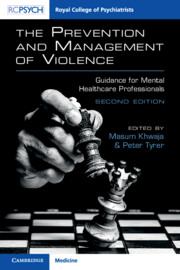Book contents
- The Prevention and Management of Violence
- The Prevention and Management of Violence
- Copyright page
- Dedication
- Contents
- Contributors
- Preface
- Abbreviations
- Section 1 General Aspects of Management
- Section 2 Medical and Psychological Intervention
- Section 3 Violence in Different Settings
- Section 4 Management in Other Groups
- Section 5 Violence and Society
- Section 6 Engagement and Understanding
- Introduction to Section 6
- Chapter 20 An Account of Service Users’ Involvement in Training Delivery on the Prevention and Management of Violence and Aggression: The Impact on Practice
- Chapter 21 Engagement With Patients and Carers to Address and Reduce the Risk of Violence and Aggression
- Index
- References
Chapter 21 - Engagement With Patients and Carers to Address and Reduce the Risk of Violence and Aggression
from Section 6 - Engagement and Understanding
Published online by Cambridge University Press: 09 May 2023
- The Prevention and Management of Violence
- The Prevention and Management of Violence
- Copyright page
- Dedication
- Contents
- Contributors
- Preface
- Abbreviations
- Section 1 General Aspects of Management
- Section 2 Medical and Psychological Intervention
- Section 3 Violence in Different Settings
- Section 4 Management in Other Groups
- Section 5 Violence and Society
- Section 6 Engagement and Understanding
- Introduction to Section 6
- Chapter 20 An Account of Service Users’ Involvement in Training Delivery on the Prevention and Management of Violence and Aggression: The Impact on Practice
- Chapter 21 Engagement With Patients and Carers to Address and Reduce the Risk of Violence and Aggression
- Index
- References
Summary
The chapter is written by a PICU consultant following consultation with carers, patients and patient leaders. The purpose of the chapter calls for the principles of co-production and co-design to be truly embedded in service models, as opposed to dilution of the principle by terms such ‘inclusion’ or ‘participation’, which do not permit the same level of influence and respect for diverse experience. The chapter could have been titled ‘nothing about us without us’, a phrase adopted by the UN to describe the principle of full participation for persons with disabilities. The chapter points out that education and training of mental health professionals is lagging and research often does not include studies or data from the perspective of carers and patients. Levels of engagement are discussed, and engaging with patients and carers is acknowledged as an essential part of understanding and developing therapeutic approaches on service, community and individual levels to identify early warning signs, triggers and minimisation strategies with regards to violence and aggression. The chapter concludes with an important reminder that service users continue to experience violence at the hands of some staff and the psychiatric system.
Keywords
- Type
- Chapter
- Information
- The Prevention and Management of ViolenceGuidance for Mental Healthcare Professionals, pp. 332 - 341Publisher: Cambridge University PressPrint publication year: 2023



